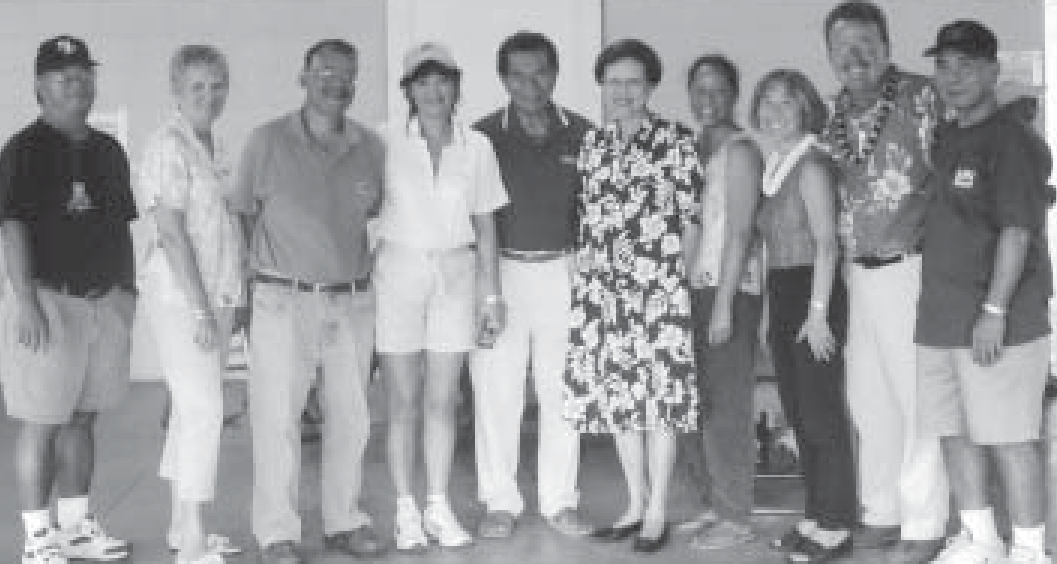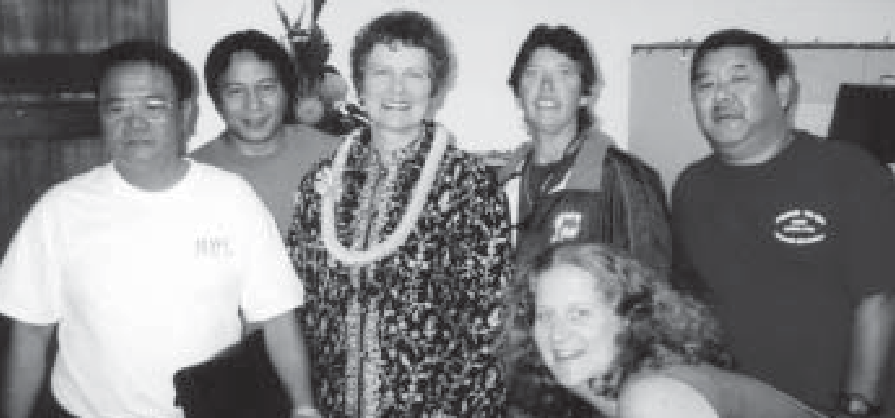Union political action wins big in Hawaii, continued from page 1
None of this happened. Instead of gaining 8 seats in the House, the Republicans lost 6 seats in areas thought to be Republican strongholds. Instead of close races, most of the targeted Democrats won by huge margins. Lingle waved signs and walked house-to-house for Republican challenger Don Couch, but Maui’s Roz Baker still beat him by over 2,400 votes. Former Republican Mayor of Kauai Maryanne Kusaka was expected to give Gary Hooser the fight of his career, but Hooser ran
away with 8,000 more votes. Oahu’s Tommy Waters beat a strong challenger by over 2,500 votes.
The elections sent a clear message to the Republican Party and Governor Lingle that Hawaii voters support their elected
legislators and are not interested in the kind of “change” advocated by the Republicans.

Kauai Division Political Action Committee members and endorsed candidates (l-r) Division Director Clayton Dela Cruz, BOE member-elect Maggie Cox, Business Agent Michael Machado, PAC coordinator Susan Seril, Representative Ezra Kanoho, Representative Bertha Kawakami, Representative Hermina Morita, Councilmember Jo Ann Yukimura, Senator Gary Hooser, Alfred Castillo.
In a representative democracy like Hawaii, the legislature makes the laws and the governor carries out the laws. According to
the Hawaii State Constitution: “the legislative power of the State shall be vested in a legislature” and the “governor shall be responsible for the faithful execution of the laws.” The legislature serves to express the will of the people because its members are elected to represent the voters of particular districts. ◆
Hawaii legislature represents the people
When Linda Lingle was elected Governor in 2002— the first Republican governor elected in forty years—she interpreted this to mean Hawaii voters wanted a change in the direction of government. Lingle tried to reshape the state to fit the Republican Party’s platform and philosophy. She proposed a number of changes which were reworked by the Legislature.
What became law was sometimes very different from Lingle’s original proposals. Instead of understanding this is how a
democracy is supposed to work, Lingle accused the Democratic majority of blocking the “will of the people.” Instead of understanding that the legislature and not the governor more closely represents the will of the people, Lingle vetoed 50 bills in 2003 and 28 bills passed by the Legislature in 2004.
Lingle continues to insist she, and not the Legislature, represents the will of the people. She expected Hawaii voters to demon-
strate their support for her program by electing more Republicans to office. When Hawaii voters did the opposite and elected more Democrats and sent five Republicans packing, Lingle blamed it on poor voter turnout from their side and misleading
campaign advertising by the Democrats. In an interview with KITV, Lingle downplayed the results. “We lost five seats by an
average of 86 votes per seat, so I don’t think that’s any major message. It was just coming up just a few votes short,” she said. [The average was actually 456 votes.]
Lingle would do well to read the Hawaii State Constitution, do her job as governor by carrying out the laws passed by the Legislature, and respect the real will of the people. ◆

Hawaii Division members with Representative Cindy Evans at the Capitol. (l-r) Nick Lopez, Gary Duguran, Evans, Robin Tadio, Kaimele Page, Lloyd Matsubara. Members’ support put Evans back in office this November.
Solidarity key to election victories
In the 2004 Elections, the ILWU joined other AFL-CIO unions in a coordinated campaign to elect legisla-
tors who will help working families. The unions interviewed these candidates, reviewed their voting records,
and got their commitment to support working class issues. Those candidates who passed the test, got the union’s endorsement.
Working under the umbrella of the Hawaii State AFL-CIO, the unions focused on helping those candidates with close races.On the Neighbor Islands, the ILWU took the lead in supporting candidates such as Joshua Green, Clift Tsuji, Cindy Evans, Roz Baker, Hermina Morita, and Gary Hooser.
On Oahu, the unions divided the work. The ILWU focused on helping Tommy Waters, Michael Magaoay, and KenIto, but the ILWU also supplied volunteers to help with a number of other campaigns. The HGEA worked with Lyla Berg and Ryan Yamane, along with the Painters, Electricians, and the Laborers. The UFCW and IBEW worked with Pono Chong. The Newspaper Guild and small unions helped Blake Oshiro. UPW, HERE, and other unions were also involved.
The unions shared data on their membership, so for example when the ILWU walked the Waimanalo district
for Tommy Waters, we visited the homes of firefighters, laborers, government employee, along with ILWU members who lived in the area.
In total, volunteers from the various unions visited 9,500 union households representing 19,677 voters. They
labeled and stuffed well over 10,000 leaflets which were mailed to houses with dogs or where no one was home.
They waved signs early in the morning and after work. They walked door-to-door with the candidate and helped in many other ways.
Their efforts paid off in the election of a State Legislature that will work harder for ordinary working people. ◆
